27/11/2023
27/11/2023

In many Second and Third World countries, a historical legacy persists, dividing society into upper, middle, and lower classes.
This societal stratification is not exclusive to democratic nations like Britain and India; though it varies in intensity, it persists despite efforts towards education, social justice, and the principles of human rights and democracy. Surprisingly, even in democracies, individuals from humble backgrounds don’t often occupy the highest and most critical positions.
The arrival of the 21st-century pandemic, the corona virus, obliterated societal distinctions. It did not discriminate between noble and homeless, rich and poor.
As individuals, regardless of their social status, found themselves in dire need of expertise and assistance, societal differences began eroding rapidly. When faced with a dire situation, titles and pride lost significance.
A person, whether titled or wealthy, readily acknowledged the worth of a doctor, even from the lower classes, who saved their life or alleviated their suffering. They expressed gratitude without hesitation, acknowledging that expertise surpassed social status.
This reality challenges the notion of a superior race, particularly as the crimes of those who once deemed themselves superior come to light. The interdependence of individuals underscores that anyone, irrespective of background, can be indispensable to another’s well-being.
The hypothetical “reasonable person” would prioritize a companion with understanding and experience over familial ties or titles on a perilous mission.
In a contemporary society, mere titles, divorced from knowledge, have diminished in value. Instances of acquiring, falsifying, or plagiarizing titles, as exemplified by an individual running a law firm without proper qualifications, have contributed to this devaluation. The emphasis has shifted towards competence and experience, rendering hollow titles obsolete.
The call for humility from those we hold in high regard is not a degradation of the soul but a source of joy. In the modern world, individuals without substantive knowledge behind their titles find little standing, particularly when many have undermined the credibility of titles through unethical practices.
The note on the term “baisari,” originating from Persian, highlights its derogatory meaning and emphasizes the importance of law and state protection in civilized societies. In such societies, individuals rely on the impartial application of law and the protection provided by state institutions rather than tribal or familial affiliations.
e-mail: [email protected]
By Ahmad alsarraf


